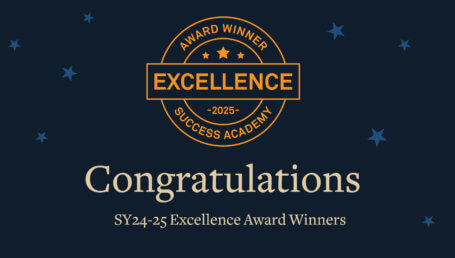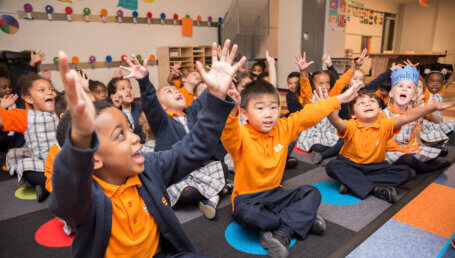
As we fine tune our focus on scholar preparation, our teachers have shifted their approach to classroom management. The aim is to create environments that build scholar autonomy and self-assuredness through high expectations for what kids can do on their own.
Nailing this change throughout the day in every classroom is still a work in progress, but the SA Rosedale kindergarten team, led by Toni Dodd, has given us a shining example of what our littlest scholars are capable of. The second week of school, SA Rosedale kindergarteners seamlessly executed a rather complex math counting jar routine without even a whisper from their teacher Starasia Darnley. We spoke to Ms. Dodd to learn about Smart Classroom Management (SCM) and how she and her team brought it about in their classrooms.
What’s your philosophy on classroom management in general and how has your thinking changed this year?
I have always been a huge believer in classroom management — if your scholars are not focused and listening there is no point in even teaching. You’re just wasting everyone’s time. But in the past, I was incentivizing the kids for everything. I wanted to make all the routines fun and I was always giving them stickers and leading cheers.
During training, we learned about lifting our expectations of what kids can do autonomously. I’ll be honest, I was worried. I wasn’t sure how we were going to get our kindergartners to do things without incentivizing them.
But my thinking shifted. I realized no one is incentivizing us to get up in the morning and do basic things like brushing our teeth. Our scholars don’t need incentives for things they should be doing anyway. They should be pushing in their chairs on their own, for example — they don’t need our interference!
Your team was able to get smart classroom management fast. How did you do it?
I would say that getting SCM was a three-step process. First, we established a vision for our classrooms. We had meetings where we agreed on what all our routines, like morning work and counting jar, would look like, and we executed them ourselves several times to work out the kinks and pitfalls.
Second, we showed the kids the routines and during the first two weeks we practiced a lot. If we didn’t have 100%, we did it again. Finally, we gave scholars the “why.” When we taught them the routines and transitions, we explained why we wanted them to do it that way and how they would benefit. And they got it. SCM is really about trust — we have to trust that our kids can do it, and they have to trust us that it’s in their best interest. Now it’s just automatic for the kids.

Ms. Dodd in the classroom
What were some of the challenges you faced in your classroom?
Changing my habits! For example, I always used to do a call and response, “Capisce? Capisce!” when I gave scholars directions, but I wanted to stop because it conveyed a lack of trust that they could simply do what I asked without checking. It was a hard habit to break so I added myself to our class “consequence chart” and asked my scholars to call me out when I slipped and said it. I think it helped them realize that I’m human too!
At the beginning, I also had the misperception that SCM meant we should no longer celebrate and cheer on any kind of win in the classroom. But then our senior leader made clear that we can and should celebrate things like great thinking or high effort. The point of SCM is to stop giving incentives for basic things like lining up that scholars can do without our involvement.
What are some of the benefits of SCM?
It’s giving us more time for instruction and it’s easier on us as teachers since we’re not micromanaging everything. I also think this approach is empowering for kids. The little ones tend to look to you for everything and now they’re learning how much they can do on their own.
What’s your advice to other teachers?
My advice is to embrace feedback! Don’t take it as a personal attack. Make sure you clearly understand what your manager is saying — ask questions, ask what it looks like and sounds like, then implement it right away. I promise you will be so much happier when you don’t have to think about behavior!










